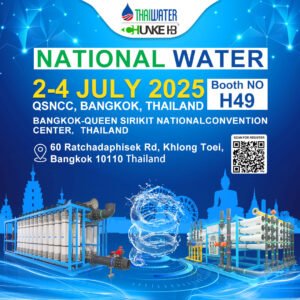Reverse Osmosis & Water Treatment in Saudi Arabia
CHUNKE projects of Reverse Osmosis Water Treatment in Saudi Arabia including different types of water treatment systems.
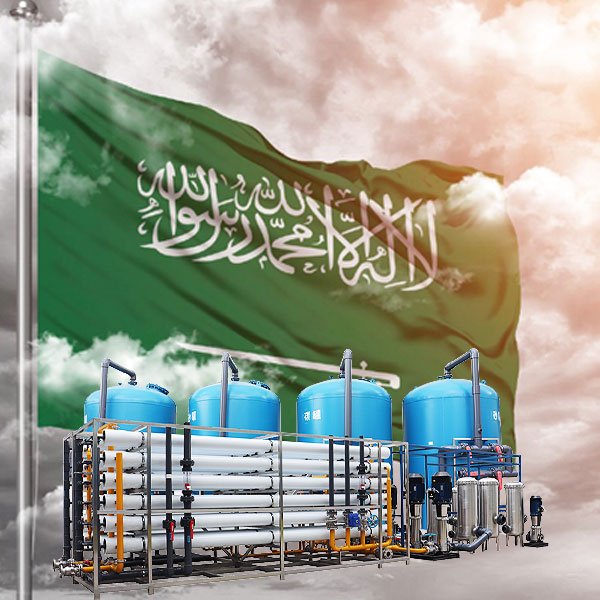
Saudi Arabia, officially the Kingdom of Saudi Arabia (KSA), is a country in West Asia. It covers the bulk of the Arabian Peninsula. And it has a land area of about 2150000 km2 (830000 sq mi), making it the fifth-largest country in Asia, the second-largest in the Arab world. And it is the largest in West Asia and the Middle East. It is bordered by the Red Sea to the west; Jordan, Iraq, and Kuwait to the north; the Persian Gulf, Qatar and the United Arab Emirates to the east; Oman to the southeast; and Yemen to the south. Bahrain is an island country off its east coast. The Gulf of Aqaba in the northwest separates Saudi Arabia from Egypt and Israel.
Saudi Arabia is the only country with a coastline along both the Red Sea and the Persian Gulf. And most of its terrain consists of arid desert, lowland, steppe, and mountains. Saudi Arabia’s capital and largest city is Riyadh; the kingdom also is the location of Islam’s two holiest cities of Mecca and Medina.
Total Renewable Water Resources in Saudi Arabia
Between 1971 and 2020, Saudi Arabia renewable water resources remained stable at around 2.4 billion cubic meters per year.
- Renewable surface water: 2.2 billion cubic meters per year
- Renewable groundwater: 2.2 billion cubic meters per year
- Renewable water resources per capita: 68.9 cubic meters per year
Meanwhile, CHUNKE provides wide range of filtration and economical solutions based on the Saudi Arabia’s water resources. So, our water treatment in Saudi Arabia becomes more popular accordingly.
- Surface water is water from river, lake which can be treated using different methods, such as Ultrafiltration Systems, Brackish Water RO accordingly.
- Desalination can be used for water from ocean, or sea source, which can be treated using Sea Water Reverse Osmosis Systems; Desalination Systems
- Ground Water or brackish water is from water located in the pore space of soil and rock “Borehole well”, which can be treated using Reverse Osmosis Systems, Borehole Water Filtration Systems, Well Water Filtration Systems, Chemical Dosing, UV Water Sterilizer accordingly.
- Government water supply, which could have high level of hardness or high level of chlorine, can be treated with Water Softener System, Media Water Filters.
CHUNKE Projects of Water Treatment in Saudi Arabia
Meanwhile, CHUNKE designs and produces water treatment systems that meet the World Health Organization requirements. So, our water treatment in Saudi Arabia is suitable for drinking.
CHUNKE has over 15 years of experience as a global provider of B2B water treatment solutions for a variety of applications and industries. Hence, we offer a large selection of all types of reverse osmosis, ultrafiltration, electrodeionization. And also, water treatment systems to meet your industrial needs accordingly. So, CHUNKE’s extensive global experience in engineering. And manufacturing allows us to pre-engineer and customize water treatment and reverse osmosis systems to meet a wide range of customer requirements and specifications.
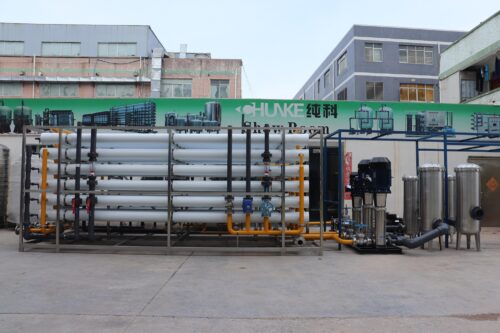
100TPH Brackish Water Desalination for Gypsum
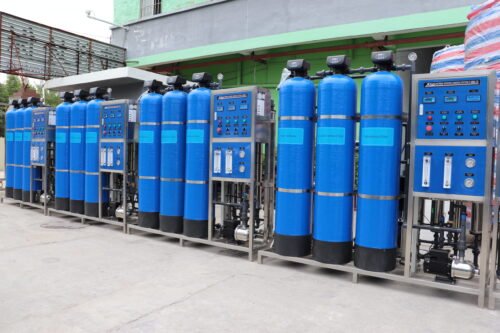
1000LPH Reverse Osmosis System for Drinking Water
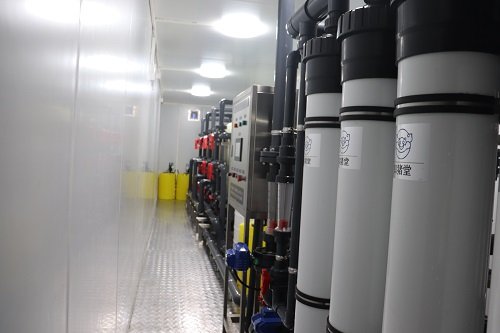
20TPH Containerized Ultrafiltration System for Drinking Water
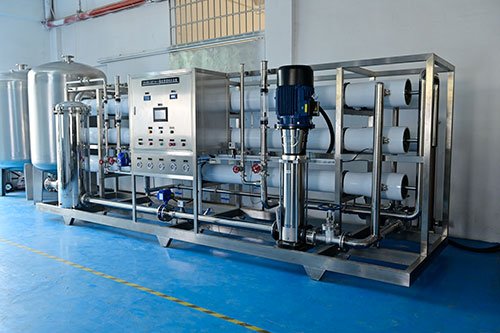
20TPH RO BWRO System for Hospital
Water Treatment in Saudi Arabia: Addressing the Kingdom's Water Challenges
Water scarcity is a significant challenge faced by Saudi Arabia, the largest country in the world without running surface water. With a rapidly growing population and expanding industries, ensuring access to clean and potable water has become a matter of utmost importance for the Kingdom. In this article, we will explore the various methods and initiatives undertaken for water treatment in Saudi Arabia, focusing on the use of reverse osmosis technology, desalination plants, and other innovative solutions.
The Need for Water Treatment
Saudi Arabia has one of the highest rates of water consumption in the world, with daily water consumption reaching 263 liters per capita in 2019. The total water consumption has exceeded 8 million cubic meters per day and is projected to reach 12.3 million cubic meters per day by 2040. However, the country faces the challenge of limited freshwater resources, with nonrenewable groundwater and reclaimed wastewater accounting for less than 40 percent of the water supply. To meet the growing demand and ensure a sustainable water supply, the Kingdom has turned to advanced water treatment technologies.
Reverse Osmosis: A Game-Changer in Water Treatment
Reverse osmosis has emerged as a game-changing technology for water treatment in Saudi Arabia. It is a highly effective method for removing contaminants and impurities from water, making it suitable for drinking and other purposes. Reverse osmosis works by applying pressure to force water molecules through a semi-permeable membrane, leaving behind salts, minerals, and other impurities. This process has proven to be highly efficient in desalinating seawater and brackish water sources.
Desalination Plants: Meeting the Water Demand
Desalination plants play a crucial role in addressing the water demand in Saudi Arabia. The Kingdom has become the leading producer of desalinated water globally, with 60 percent of its water supply coming from desalination. The Saline Water Conversion Corporation (SWCC), a government-run organization, operates 33 desalination plants across the country, accounting for approximately 69 percent of desalination in Saudi Arabia.
Major Desalination Projects in Saudi Arabia
To meet the rising demand for water, Saudi Arabia has undertaken major desalination projects. Independent Water and Power Projects (IWPPs) have been developed, allowing for private sector participation in the construction and operation of desalination plants. These projects include Shuaibah III, Jubail III, and Shuqaiq II, which have significantly increased the water production capacity in the Kingdom.
Solar-Powered Desalination: A Sustainable Solution
In addition to traditional desalination methods, Saudi Arabia is leading the world in developing solar-powered desalination plants. By harnessing solar energy, these plants not only reduce dependency on fossil fuels but also contribute to the Kingdom’s efforts in promoting sustainability. The King Abdullah City for Science and Technology (KACST) has been at the forefront of these innovations, collaborating with international partners to develop nanotechnology and solar-powered desalination processes.
Advancements in Water Treatment Technologies
Apart from reverse osmosis and desalination, Saudi Arabia is actively exploring other water treatment technologies to ensure a sustainable and reliable water supply. These technologies include ultrafiltration, electrodeionization (EDI), and advanced water filtration systems.
Ultrafiltration: Enhancing Water Purity
Ultrafiltration is a membrane-based filtration process that removes suspended solids, bacteria, and viruses from water. This technology is widely used in water treatment plants to enhance the purity of the water supply. In Saudi Arabia, ultrafiltration systems are employed to treat both seawater and brackish water sources, ensuring the production of high-quality potable water.
Electrodeionization (EDI): A Clean and Efficient Process
Electrodeionization (EDI) is an advanced water treatment technology that combines both ion exchange and electrochemical processes. It eliminates the need for chemical regeneration, making it a clean and environmentally friendly method. EDI systems are used in water purification plants in Saudi Arabia to produce high-purity water for various applications, including industrial processes and pharmaceutical production.
Advanced Water Filtration Systems: Ensuring Water Safety
Saudi Arabia has implemented advanced water filtration systems to ensure the safety and purity of the water supply. These systems utilize state-of-the-art filtration media and technologies to remove contaminants, sediments, and microorganisms from water. By implementing these systems, the Kingdom can provide clean and safe drinking water to its population.
Initiatives and Investments in Water Treatment
Saudi Arabia has made substantial investments in water treatment infrastructure and initiatives to address the water challenges faced by the Kingdom. The Saline Water Conversion Corporation (SWCC) and the National Water Company (NWC) have played pivotal roles in the development and implementation of these initiatives.
Water treatment in Saudi Arabia is of paramount importance to ensure a sustainable and reliable water supply for the Kingdom’s growing population and industries. Through the use of advanced technologies such as reverse osmosis, desalination, and innovative solutions like solar-powered desalination, Saudi Arabia is making significant strides in addressing its water challenges. With ongoing investments and initiatives, the Kingdom is well-positioned to overcome its water scarcity and provide its population with clean and safe drinking water.
Chunke Water Treatment‘s expertise in producing high-quality reverse osmosis systems has contributed to improving water treatment capabilities in Saudi Arabia. So, their reliable and efficient RO plants have been implemented in various projects across the country, ensuring access to clean and safe drinking water.

